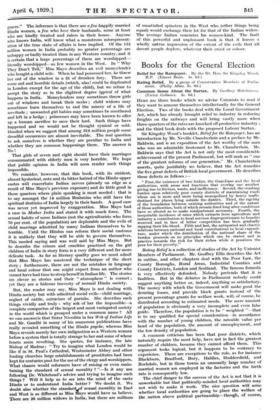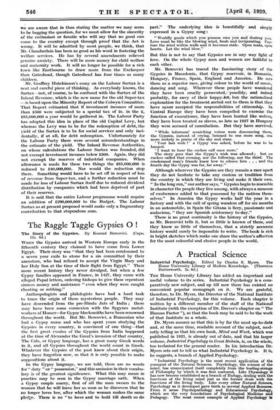Books for the General Election
HERE are three books which we advise Unionists to read if they want to armour themselves intellectually for the General Election. Two of the books deal with the Local Government Act, which has already brought relief to industry in reducing freights on the railways and will bring vastly more when three-quarters of the rates are knocked off productive industry ; and the third book deals with the proposed Labour Surtax.
Sir Kingsley Wood's booklet, Relief for the Ratepayer, has an introduction by Mr. Neville Chamberlain and a preface by Mr. Baldwin, and is an exposition of the Act worthy of the man who was an admirable lieutenant to Mr. Chamberlain. Mr. Baldwin says that the Act is not only the most considerable achievement of the present Parliament, but will rank as " one of the greatest reforms of our generation." Mr. Chamberlain asserts, quite justifiably we believe, that the Act remedies the five great defects of British local government. He describes these defects as follows :-
" First, the existence of two bodies, the Guardians and the local authorities, with areas and functions that overlap one another giving rise to friction, waste, and inefficiency. Second, the crushing burden upon relatively poor county districts of maintaining roads whose use is more and more being monopolized by heavy traffic destined for places lying outside the district. Third, the rigidity of the boundaries between existing authorities and of the nature of those authorities, both of which remain fixed long after conditions have so altered as to make readjustment necessary. Fourth, the inequitable incidence of rates which extracts from agriculture and industry a contribution to local services disproportionate to benefits received and in face of bitter competition has been gradually sapping their life-blood.• Fifth and last, the antiquated and chaotic relations between national and local contributions to local expendi- ture, under which the distribution of the national share of the burden proceeds on no principles which can be stated and in practice rewards the rich for their riches while it penalizes the poor for their poverty."
Rating Relief is a collection of studies of the Act by Unionist Members of Parliament. Mr. Geoffrey Ellis describes the Act in outline„ and and other chapters deal with the Poor Law, the County Boroughs, Rural Areas, Industrial Counties and County Districts, London and Scotland. The famous formula is very effectively defended. Nobody pretends that it is faultless. But in the debates in Parliament nobody could suggest anything better or, indeed, anything so satisfactory. The money with which the Government will make good the derating losses, and provide block grants instead of the present percentage grants for welfare work, will, of course, be distributed according to estimated needs. The mere amount of population is obviously a very incomplete and even false guide. Therefore, the population is to be ” weighted "—that is to say qualified for special consideration—in accordance with the number of young children, the rateable value per head of the population, the amount of unemployment, and the low density of population.
A common criticism has been that poor districts, which naturally require the most help, have not in fact the greatest number of children, because they cannot afford them. This argument looks logical, but it happens to be contrary to experience. There are exceptions to the rule, as for instance Blackburn, Bradford, Bury, Halifax, Huddersfield, and Rochdale, but in those towns an unusually large number of married women are employed in the factories and the birth rate is consequently low. . The chief danger to the success of the Act is not that it is
unworkable but that politically-minded local authorities may not wish to make it work. The nice question will arise whether local authorities are going to place the welfare of the nation above political partisanship—though, of course. we are aware that in thus stating the matter we may seem to be begging the question, for we must allow for the sincerity of the enthusiast or fanatic who will say that no good can come to the country except through proof that the Act is wrong. It will be admitted by most people, we think, that Mr. Chamberlain has been as good as his word in fostering the welfare services. He has by several amendments relieved genuine anxiety. There will be more money for child welfare and maternity work. It will no longer be possible for a rich town like Eastbourne to draw more from the Exchequer than Gateshead, though Gateshead has four times as many children.
Mr. Geoffrey Hutchinson's essay on the Labour Surtax is a neat and careful piece of thinking. As everybody knows, the Surtax—not, of course, to be confused with the Surtax of the Inland Revenue, which is the new name for the old Super-tax —is based upon the Minority Report of the Colwyn-Committee. That Report estimated that if investment incomes of more than £500 were subjected to a special tax of 2s. in the £, R85,000,000 a year would be gathered in. The Labour Party has adopted this idea in place of the old Capital Levy, but whereas the Levy was to be for the redemption of debt, the yield of the Surtax is to be for social services and only inci- dentally, if at all, for debt redemption. Unfortunately for the Labour Party there were several misunderstandings in the estimate of the yield. The Inland Revenue Authorities, on whose calculations the Labour Surtax was founded, did not exempt investment incomes below £500. Again, they did not exempt the reserves of industrial companies. When allowance is made for these two things the £85,000,000 is reduced to £40,000,000. Nor would the reduction stop there. Something would have to be set off in respect of loss of revenue from Super-tax, and a further reduction must be made for loss of Labour Surtax itself due to reduced dividend distribution by companies which had been deprived of part of their reserves.
It is said that the entire Labour programme would require an addition of £290,000,000 to the Budget. The Labour Surtax as at present proposed would make only a fragmentary contribution to that stupendous sum.







































 Previous page
Previous page